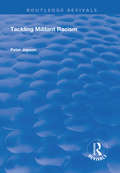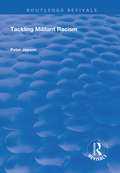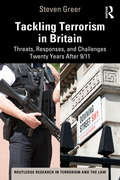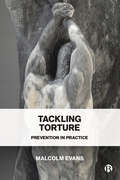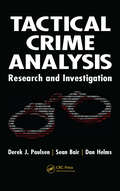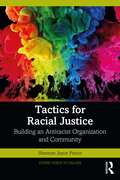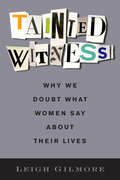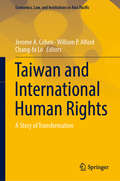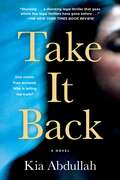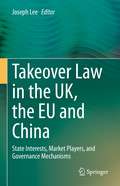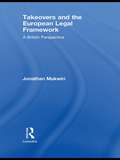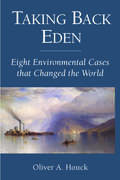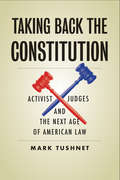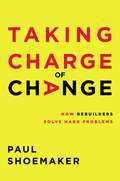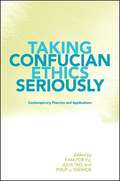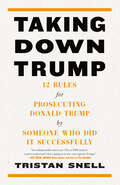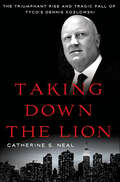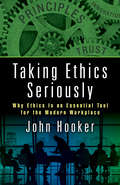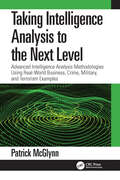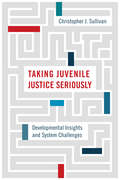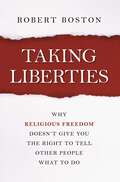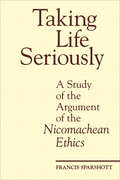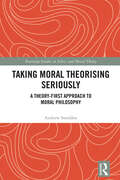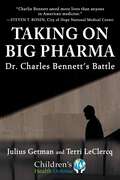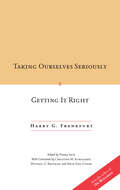- Table View
- List View
Tackling Militant Racism
by Peter JepsonThis title was first published in 2003. Militant racism is concerned with antagonism and hostility associated with racist activity. Within a society it is expressed by material that may stir up racial hatred and/or discrimination. It can also be seen on the streets and, indeed, the alleged racist criminality orchestrated by militant gangs. After examining the possible causes of militant racism and its effects, this book considers the new laws designed to tackle racially-motivated crime found in the 1998 Crime and Disorder Act. A central theme of the book is the balance between freedom of expression and penalizing racially-offensive expression.
Tackling Militant Racism (Routledge Revivals Ser.)
by Peter JepsonThis title was first published in 2003. Militant racism is concerned with antagonism and hostility associated with racist activity. Within a society it is expressed by material that may stir up racial hatred and/or discrimination. It can also be seen on the streets and, indeed, the alleged racist criminality orchestrated by militant gangs. After examining the possible causes of militant racism and its effects, this book considers the new laws designed to tackle racially-motivated crime found in the 1998 Crime and Disorder Act. A central theme of the book is the balance between freedom of expression and penalizing racially-offensive expression.
Tackling Terrorism in Britain: Threats, Responses, and Challenges Twenty Years After 9/11 (Routledge Research in Terrorism and the Law)
by Steven GreerIn September 2001, the world witnessed the horrific events of 9/11. A great deal has happened on the counterterrorist front in the 20 years since. While the terrorist threat has greatly diminished in Northern Ireland, the events of 9/11 and their aftermath have ushered in a new phase for the rest of the UK with some familiar, but also many novel, characteristics. This ambitious study takes stock of counterterrorism in Britain in this anniversary year. Assessing current challenges, and closely mirroring the ‘four Ps’ of the official CONTEST counterterrorist strategy – Protect, Prepare, Prevent, and Pursue – it seeks to summarize and grasp the essence of domestic law and policy, without being burdened by excessive technical detail. It also provides a rigorous, context-aware, illuminating, yet concise, accessible, and policy-relevant analysis of this important and controversial subject, grounded in relevant social science, policy studies, and legal scholarship. This book will be an important resource for students and scholars in law and social science, as well as human rights, terrorism, counterterrorism, security, and conflict studies.
Tackling Torture: Prevention in Practice
by Malcolm D. EvansHow big a problem is torture? Are the right things being done to prevent it? Why does the UN appear at times to be so impotent in the face of it? In this vitally important work, Malcolm D. Evans tells the story of torture prevention under international law, setting out what is really happening around the world. Challenging assumptions about torture’s root causes, he calls for what is needed to enable us to bring about change. The author draws on over ten years’ experience as Chair of the UN Subcommittee on Prevention of Torture to give a frank account of the remarkable capacities of this system, what it has achieved in practice, or not been able to achieve – and most importantly, why.
Tactical Crime Analysis: Research and Investigation
by Derek J. Paulsen Sean Bair Dan HelmsResearch has shown that the majority of crimes are committed by persistent or serial offenders, with as little as seven percent of offenders accounting for approximately 60 percent of all crimes. By focusing police efforts on these prolific offenders and learning to identify, analyze, and resolve the crimes they commit, the law enforcement communit
Tactics for Racial Justice: Building an Antiracist Organization and Community (Giving Voice to Values)
by Shannon Joyce PrinceThis is not a book of antiracist theory but antiracist tactics – tactics that anyone, of any race, can use to strike a blow against injustice. Antiracism is not about what we feel but what we do, and there are specific techniques we can use to create a just world. Antiracist strategies are skills that can be learned just as we learn skills for public speaking or hitting a baseball. In these pages, you – whether a person of color or white – will find a playbook for leading your workplace, organization, or community through transformative change in the wake of an act of explicit racism. You’ll learn to play antiracist rhetorical chess, and to anticipate and effectively respond to the discursive moves of people who don’t understand bigotry, aren’t aware of it, are in denial of it, or even actively uphold it – so that you can advance justice goals. You’ll get a blueprint of how to dismantle systemic racism community by community, workplace by workplace, and organization by organization – and examples of what not to do. This book is aimed at people who are conscious of the reality of racism and want to end it but may not know how. It clearly shows how anyone can make an effective, significant, and measurable impact on racism through strategic action.
Tainted Witness: Why We Doubt What Women Say About Their Lives (Gender and Culture Series)
by Leigh GilmoreIn 1991, Anita Hill's testimony during Clarence Thomas's Senate confirmation hearing brought the problem of sexual harassment to a public audience. Although widely believed by women, Hill was defamed by conservatives and Thomas was confirmed to the Supreme Court. The tainting of Hill and her testimony is part of a larger social history in which women find themselves caught up in a system that refuses to believe what they say. Hill's experience shows how a tainted witness is not who someone is, but what someone can become. Why are women so often considered unreliable witnesses to their own experiences? How are women discredited in legal courts and in courts of public opinion? Why is women's testimony so often mired in controversies fueled by histories of slavery and colonialism? How do new feminist witnesses enter testimonial networks and disrupt doubt? Tainted Witness examines how gender, race, and doubt stick to women witnesses as their testimony circulates in search of an adequate witness. Judgment falls unequally upon women who bear witness, as well-known conflicts about testimonial authority in the late twentieth and early twenty-first centuries reveal. Women's testimonial accounts demonstrate both the symbolic potency of women's bodies and speech in the public sphere and the relative lack of institutional security and control to which they can lay claim. Each testimonial act follows in the wake of a long and invidious association of race and gender with lying that can be found to this day within legal courts and everyday practices of judgment, defining these locations as willfully unknowing and hostile to complex accounts of harm. Bringing together feminist, literary, and legal frameworks, Leigh Gilmore provides provocative readings of what happens when women's testimony is discredited. She demonstrates how testimony crosses jurisdictions, publics, and the unsteady line between truth and fiction in search of justice.
Taiwan and International Human Rights: A Story of Transformation (Economics, Law, and Institutions in Asia Pacific)
by Chang-Fa Lo Jerome A. Cohen William P. AlfordThis book tells a story of Taiwan’s transformation from an authoritarian regime to a democratic system where human rights are protected as required by international human rights treaties. There were difficult times for human rights protection during the martial law era; however, there has also been remarkable transformation progress in human rights protection thereafter. The book reflects the transformation in Taiwan and elaborates whether or not it is facilitated or hampered by its Confucian tradition. There are a number of institutional arrangements, including the Constitutional Court, the Control Yuan, and the yet-to-be-created National Human Rights Commission, which could play or have already played certain key roles in human rights protections. Taiwan’s voluntarily acceptance of human rights treaties through its implementation legislation and through the Constitutional Court’s introduction of such treaties into its constitutional interpretation are also fully expounded in the book. Taiwan’s NGOs are very active and have played critical roles in enhancing human rights practices. In the areas of civil and political rights, difficult human rights issues concerning the death penalty remain unresolved. But regarding the rights and freedoms in the spheres of personal liberty, expression, privacy, and fair trial (including lay participation in criminal trials), there are in-depth discussions on the respective developments in Taiwan that readers will find interesting. In the areas of economic, social, and cultural rights, the focuses of the book are on the achievements as well as the problems in the realization of the rights to health, a clean environment, adequate housing, and food. The protections of vulnerable groups, including indigenous people, women, LGBT (lesbian, gay, bisexual, and transgender) individuals, the disabled, and foreigners in Taiwan, are also the areas where Taiwan has made recognizable achievements, but still encounters problems. The comprehensive coverage of this book should be able to give readers a well-rounded picture of Taiwan’s human rights performance. Readers will find appealing the story of the effort to achieve high standards of human rights protection in a jurisdiction barred from joining international human rights conventions.
Take It Back: A Novel
by Kia AbdullahFrom author Kia Abdullah, Take It Back is a harrowing and twisting courtroom thriller that keeps you guessing until the last page is turned.One victim. Four accused. Who is telling the truth?Zara Kaleel, one of London's brightest legal minds, shattered the expectations placed on her by her family and forged a brilliant legal career. But her decisions came at a high cost, and now, battling her own demons, she has exchanged her high profile career for a job at a sexual assault center, helping victims who need her the most. Victims like Jodie Wolfe.When Jodie, a sixteen-year-old girl with facial deformities, accuses four boys in her class of an unthinkable crime, the community is torn apart. After all, these four teenage defendants are from hard-working immigrant families and they all have proven alibis. Even Jodie's best friend doesn't believe her.But Zara does—and she is determined to fight for Jodie—to find the truth in the face of public outcry. And as issues of sex, race and social justice collide, the most explosive criminal trial of the year builds to a shocking conclusion.
Takeover Law in the UK, the EU and China: State Interests, Market Players, and Governance Mechanisms
by Joseph LeeThis book investigates stakeholders’ interests, market players, and governance models for the takeover market in the changing global economic orders. Authors from the UK, Germany, the Netherlands, Australia, and China discuss takeovers in the context of China as a rising power in the global M&A market and re-examine takeover as an efficient method for corporate competition, consolidation, and restructuring. China has come to embrace takeovers as a market practice and is seeking directions for further reforms of its law, regulatory model, and banking system in order to compete with other economic powers. Yet, China is at a very different economic development stage and has different legal and political structures. State-owned enterprises dominate the Shanghai and Shenzhen stock markets – a very different landscape from UK and European exchanges. Researchers and policy makers are currently developing options in response to needs for reform. Recently, China has also announced the opening of its financial markets to foreign ownership. This book reflects on the UK and European models and focuses on the policy choices for China to transform its capital market. The book is of interest to postgraduate students and researchers (LLM, PhD, postdocs), law and management/finance academics, and policy makers.
Takeovers and the European Legal Framework: A British Perspective
by Jonathan MukwiriSince the implementation of the European Directive on Takeover Bids, a European common legal framework governs regulation of takeovers in EU Members States. The European Directive on Takeover Bids was adopted in April 2004, and implemented in the UK and in other Member States on 20th May 2006. The Directive seeks to regulate takeovers by way of protecting investors, and harmonising takeover laws in Europe. In facilitating the restructuring of companies through takeovers, the Directive aims at reinforcing the free movement of capital. Takeovers and the European Legal Framework studies the European Community Directive on Takeover Bids, in order to provide greater understanding of both the impact and effect of the European legal framework of takeover regulation. It firstly looks at the Directive from a British perspective, focusing on the impact of the transposition of the Takeover Directive into the UK. The book examines the provisions of the City Code on Takeovers and Mergers, and discusses the takeover provisions in the Companies Act 2006 that implement the Takeover Directive in the UK, arguing that the Directive will provide a new basis for UK takeover regulation, and that the system will work well. Jonathan Mukwiri goes on to consider the Directive in relation to the EU, arguing that despite its deficiencies, in that Member States are free to opt to restrict takeovers, the Directive provides a useful legal framework by which takeovers are regulated in different jurisdictions. Mukwiri highlights how the freedoms of the EC Treaty and EU Directives interact, and the effects of the Takeover Directive on political considerations in the law-making process in European Community. Moreover, he argues that the future of EU takeover regulation is likely to follow the lead of the UK, making this book relevant to a wide range of policy makers and academics across Europe.
Taking Back Eden: Eight Environmental Cases that Changed the World
by Oliver A. HouckTaking Back Eden is the gripping tale of an idea--that ordinary people have the right to go to court to defend their environment--told through the stories of lawsuits brought in eight countries around the world. Starting in the United States in the l960's, this idea is now traveling the planet, with impacts not just on imperiled environments but on systems of justice and democracy. It has brought people back into the question of governing the quality of their lives. Author Oliver Houck describes the sites under contention in their place and time, the people who rose up, their lawyers, strategies, obstacles, setbacks and victories. Written for general readers, students, and lawyers alike, Taking Back Eden tells the stories of a lone fisherman intent on protecting the Hudson River, a Philippine lawyer boarding illegal logging ships from the air, the Cree Indian Nation battling for its hunting grounds, and a civil rights attorney who set out to save the Taj Mahal. The cases turn on Shinto and Hindu religions, dictatorships in Greece and Chile, regime changes in Russia, and on a remarkable set of judges who saw a crisis and stepped up to meet it in similar ways. Spontaneously, without communication among each other, their protagonists created a new brand of law and hope for a more sustainable world.
Taking Back the Constitution: Activist Judges and the Next Age of American Law
by Mark TushnetHow the Supreme Court’s move to the right has distorted both logic and the Constitution What Supreme Court justices do is far more than just “calling balls and strikes.” The Court has never simply evaluated laws and arguments in light of permanent and immutable constitutional meanings. Social, moral, and yes, political ideas have always played into the justices’ impressions of how they think a case should be decided. Mark Tushnet traces the ways constitutional thought has evolved, from the liberalism of the New Deal and the Great Society to the Reagan conservatism that has been dominant since the 1980s. Looking at the current crossroads in the constitutional order, Tushnet explores the possibilities of either a Trumpian entrenchment of the most extreme ideas of the Reagan philosophy, or a dramatic and destabilizing move to the left. Wary of either outcome, he offers a passionate and informed argument for replacing judicial supremacy with popular constitutionalism—a move that would restore to the other branches of government a role in deciding constitutional questions.
Taking Charge of Change: How Rebuilders Solve Hard Problems
by Paul ShoemakerThe model to meet the unprecedented challenges unique to the decade ahead and make a remarkable impact on people&’s lives—led by the success stories of 38 change leaders whose paths of action give you the blueprint.To meet the radically different challenges of inequity, division, and scarcity of resources that will only increase over the next ten years, the most successful and valuable leaders are those with the traits to be rebuilders.Thought leader Paul Shoemaker profiles 38 rock star rebuilders so you have a model to follow, including Peter Drucker Award winner Rosanne Haggerty, whose goal is to end chronic homelessness; Trish Millines, who has changed lives for kids of color in high tech; and David Risher, whose cross-sector approach is helping solve global illiteracy.Page by page, the common elements rebuilders utilize to make a remarkable impact on some or our most complex problems are highlighted as you: Learn the 5 vital traits change leaders use to solve big problems.Gain new perspective from relevant research, data, leadership lessons, and 3 case studies that illuminate the path ahead.Meet the leaders setting the standard for social change impact, all shared in Shoemaker&’s signature storytelling style.Taking Charge of Change is written for anyone seeking to be the driver of real change and an integral part of rebuilding the structures and foundations of American communities and companies throughout the decade ahead.
Taking Confucian Ethics Seriously: Contemporary Theories and Applications (Suny Series in Chinese Philosophy and Culture)
by Philip J. Ivanhoe Julia Tao Kam-Por YuMany—though surely not all—people who have lived in Confucian societies have taken Confucian ethics seriously for hundreds of generations, but why should one study Confucian ethics today?
Taking Down Trump: 12 Rules for Prosecuting Donald Trump by Someone Who Did It Successfully
by Tristan Snell"An indispensable must-read. This is THE book to read to understand what&’s going on in the cases against Trump.&” — Joy Reid, MSNBC News anchor and host of The ReidOut A former prosecutor provides an essential guide to ensuring that Donald Trump, and other oligarchs of his ilk, no longer beat the rap, and face serious jail time for their crimes . . . For a half century Donald Trump has evaded justice. Now he finally faces trials for his lies, cons, and misdeeds—but many fear Trump will never face any real consequences. Is our system so broken that some people are now above the law? In Taking Down Trump, Tristan Snell—a former assistant attorney general for New York State who took on and beat Trump in a court of law—argues that Donald Trump can indeed be defeated, and shares his secrets for how to beat him. Snell led New York State&’s prosecution of Donald Trump for defrauding hundreds of Trump University students, resulting in Trump having to shell out $25 million to his victims —Trump&’s first and only major legal loss to date. Snell lays out 12 key rules for how to beat Trump—including:How voters and activists hold prosecutors accountableHow to stand up to Trump&’s public bullyingHow to persevere against all the stonewalling and counterattacksHow to get key figures to cooperate and cough up critical evidence Along the way, Snell discusses his own experience prosecuting Trump, and observes how prosecutors in the various cases against Trump are exploiting such rules—or not—as well as how Trump&’s revolving team of lawyers can be expected to behave, or, more accurately, perform. Whether you&’re a concerned citizen, a lawyer or prosecutor, or an activist or advocate, Snell shows how America&’s systems can still work to bring even the richest and most powerful to justice, and why those systems are worth preserving and improving. Ultimately, this is a road map for how America can begin to escape the Trump wilderness of fraud and fascism.
Taking Down the Lion: The Triumphant Rise and Tragic Fall of Tyco's Dennis Kozlowski
by Catherine S. NealTaking Down the Lion offers an inside look at the career of Tyco's most infamous CEO, and what exactly brought him down so publicly.As the widely-admired CEO of Tyco International, Dennis Kozlowski grew a little-known New Hampshire conglomerate into a global giant. In a stunning series of events, Kozlowski suddenly lost his job along with his favored public status when he was indicted by legendary Manhattan DA Robert Morgenthau—it was an inglorious end to an otherwise brilliant career. Kozlowski was the face of corporate excess in the turbulent post-Enron environment; he was pictured under headlines that read "Oink Oink," and publicly castigated for his extravagant lifestyle. "Deal-a-Day Dennis" was transformed into the "poster child for corporate greed." Kozlowski was ultimately convicted of grand larceny and other crimes that, in sum, found the former CEO guilty of wrongfully taking $100 million from Tyco.Taking Down the Lion shines a bright light on former CEO Dennis Kozlowski and the Tyco corporate scandal—it is the definitive telling of a largely misunderstood episode in U.S. business history. In an unfiltered view of corporate America, Catherine S. Neal pulls back the curtain to reveal a world of big business, ambition, money, and an epidemic of questionable ethics that infected not only business dealings but extended to attorneys, journalists, politicians, and the criminal justice system. When the ugly truth is told, it's clear the "good guys" were not all good and the "bad guys" not all bad. And there were absolutely no heroes.
Taking Ethics Seriously: Why Ethics Is an Essential Tool for the Modern Workplace
by John HookerThis book develops an intellectual framework for analyzing ethical dilemmas that is both grounded in theory and versatile enough to deal rigorously with real-world issues. It sees ethics as a necessary foundation for the social infrastructure that makes modern life possible, much as engineering is a foundation for physical infrastructure. It is not wedded to any particular ethical philosophy but draws from several traditions to construct a unified and principled approach to ethical reasoning. Rather than follow the common academic practice of seeking a reflective equilibrium of moral intuitions and principles, it builds on a few bedrock principles of rational thought that serve as criteria for valid argumentation. It develops the ideas from the ground up, without presupposing any background in ethics or philosophy. Epistemologically, the book views ethics as parallel to mathematics, in that it relies on generally accepted proof techniques to establish results. Whereas mathematics rests on such proof paradigms as mathematical induction and proof by contradiction, ethics can be seen as relying on proof by applying consistency tests, such as generalizability and respect for autonomy. Utilitarianism also plays a key role, but it is reconceived as a deontological criterion. This approach obviously requires that these criteria be formulated more rigorously than is normally the case. To accomplish this, the book begins with the classical idea that an action is distinguishable from mere behavior by virtue of its having a coherent rationale, where coherence requires passing certain consistency tests such as generalizability. An action is therefore inseparable from its rationale, and generalizability is defined in terms of consistency with the rationale. A utilitarian criterion receives a similar treatment with respect to a means-end rationale. Respect for autonomy is grounded in a carefully developed action theory that takes into account such concepts as joint autonomy, implied consent, and the permissibility of interference with unethical behavior. It provides an account of responsibility that is both practical and theoretically satisfying, and it yields a novel solution of the much-discussed trolley car dilemmas. The book is written for a general audience and strives to be as readable and engaging as possible, while maintaining rigor. It begins by dispelling a raft of misconceptions that trivialize ethics and block its development as an essential tool of modern life, such as the notion that ethics is just a matter of opinion without rational foundation. After presenting the ethical principles just described, along with many examples, it provides several chapters that analyze real-life dilemmas, many obtained from the author’s students and professional workshop participants. One cannot understand physics or chemistry without seeing how their principles are applied to real problems, and the same is true of ethics. These chapters demonstrate that a unified normative theory can deal with a wide range of real cases while achieving a reasonable level of objectivity and rigor.
Taking Intelligence Analysis to the Next Level: Advanced Intelligence Analysis Methodologies Using Real-World Business, Crime, Military, and Terrorism Examples
by Patrick McGlynnTaking Intelligence to the Next Level: Advanced Intelligence Analysis Methodologies Using Real-World Business, Crime, Military, and Terrorism Examples examines intelligence gathering and analysis and the significance of these programs. Coverage assumes a basic understanding of the intelligence cycle and processes, and the book builds upon the author’s previous text, Intelligence Analysis Fundamentals—also published by CRC Press—to further address various types of intelligence, the function and increasing usage of intelligence in both the private and public sectors, and the consumption of intelligence products to inform strategic decision-making. Developed for a classroom environment, chapters are packed with multiple examples, visuals, and practical exercises tailored for the intelligence community (IC), military intelligence analyst, criminal, or business analyst alike. The text begins with a chapter on analytical ethics, an important topic that sets the tone for those to come that cover intelligence gathering analytical techniques. The author utilizes multiple instructive learning approaches to build on the student’s existing analytical skills gained from other training resources, their experience, or some other combination. While topics covered are germane to all intelligence analysis fields—including military, national, political, criminal, and business—specific chapters and sections and most instructional examples, scenarios, exercises, and learning activities focus on the Homeland Security Mission and the associated problem sets. The training presentation methods and instructional approaches are the product of much thought, research, and discussion, and a variety of US government and commercial analytical training methodologies are presented. The book closes with a final chapter looking at future trends in intelligence analysis. Key Features: Provides tools to challenge intelligence assessments systematically and objectively, a prerequisite to vetted intelligence conclusions Outlines diagnostic techniques to explain events or data sets, anticipate potential outcomes, predict future trends, and make decisions for optimal outcomes Details how to conduct research to effectively write, edit, format, and disseminate reports to best effect An accompany Instructor’s Guide, for use in the classroom, contains the same practical exercises as those found in the student text, as well as facilitator’s guides, practical exercise solutions, discussion points, sample test questions, and answer keys, to include other websites that can provide additional instructional content. Taking Intelligence to the Next Level serves as an essential course textbook for programs in intelligence, terrorism, and Homeland Security in additional to serving a useful reference for practiving professionals. Ancillaries including PowerPoint lecture slides, as well as the Instructor’s Guide with Test Bank, are available for qualified course adopters.
Taking Juvenile Justice Seriously: Developmental Insights and System Challenges
by Christopher J. SullivanThe juvenile justice system navigates a high degree of variation in youthful offenders. While professionals with insights about reform and adolescent development consider the risks, the needs, and the patterns of delinquency of youth, too little attention is paid to the responses and practicalities of a system that is both complex and limited in its resources. In his essential book, Taking Juvenile Justice Seriously, Christopher Sullivan systematically analyzes key facets of justice-involved youth populations and parses cases to better understand core developmental influences that affect delinquency. He takes a comprehensive look at aspects of the life-course affected by juvenile justice as well as at the juvenile justice system’s operations and its multifaceted mission of delivering both treatment and sanctions to a varied population of youths. Taking Juvenile Justice Seriously first provides an overview of the youth who encounter the system, then describes its present operations and obstacles, synthesizes relevant developmental insights, and reviews current practices. Drawing on research, theory, and evidence regarding innovative policies, Sullivan offers a series of well-grounded recommendations that suggest how to potentially—and realistically—implement a more effective juvenile justice system that would benefit all.
Taking Liberties: Why Religious Freedom Doesn't Give You the Right to Tell Other People What to Do
by Robert BostonA concise and lucid explanation of what religious freedom is and isn'tIncreasingly, conservative religious groups are using religious liberty as a sword to lash out at others. In this forcefully argued defense of the separation of church and state, Robert Boston makes it clear that the religious freedom guaranteed in the First Amendment is an individual right, the right of personal conscience, not a license allowing religious organizations to discriminate against and control others. The book examines the controversy over birth control, same-sex marriage, religion in public schools, the intersection of faith and politics, and the "war on Christmas," among other topics.Boston concludes with a series of recommendations for resolving clashes between religious liberty claims and individual rights.
Taking Life Seriously: A Study of the Argument of the Nicomachean Ethics
by F. E. SparshottThis is the first book in modern times that makes sense of the Nicomachean Ethics in its entirety as an interesting philosophical argument, rather than as a compilation of relatively independent essays. In Taking Life Seriously Francis Sparshott expounds Aristotle's Nicomachean Ethics as a single continuous argument, a chain of reasoned exposition on the problems of human life. He guides the reader through the whole text passage by passage, showing how every part of it makes sense in the light of what has gone before, as well as indicating problems in Aristotle's argument. No knowledge of Greek is required. When the argument does depend on the precise wording of the Greek text, translations and explanatory notes are provided, and there is a glossary of Greek terms. Sparshott offers insightful and useful criticism, making Taking Life Seriously the best available companion to a first reading of the Ethics.
Taking Moral Theorising Seriously: A Theory-First Approach to Moral Philosophy (Routledge Studies in Ethics and Moral Theory)
by Andrew SneddonThis book develops a plausible and novel account of methodology for moral philosophy. It focuses on the structural features of moral theories, specifically what is taken as input and the process of theorising itself.Philosophers have long neglected the difficulties of identifying and using good input for moral theorising. The first part of the book argues that we should use “contrastively successful” judgements as input. A moral judgement about a case must be shown to be interpersonally superior to alternatives to qualify as input for moral theorising. The next part of the book follows recent work on theoretical virtues in science to develop an account of virtues of moral theories. It argues that moral theorists should seek defeasibly parallel maximisation of the virtues of moral theories. It then applies this overall account of a method for moral philosophy to the topic of agent-relativity and agent-neutrality.Taking Moral Theorising Seriously will appeal to researchers and graduate students interested in moral philosophy and philosophical methodology.
Taking On Big Pharma: Dr. Charles Bennett's Battle (Children’s Health Defense)
by Julius Getman Terri LeClercqThe battle between Big Pharma and scientific integrity Larger-than-life, creative, and fiercely ambitious, Dr. Charlie Bennett has a long history of revealing dangerous side effects of bestselling medicines. In 2006, his meta-analysis of existing data showed that top-selling ESAs (erythropoietin stimulating agents) created previously unrecognized risks, deaths, and serious illness. According to Dr. Steven Rosen, chief medical officer of the City of Hope Cancer treatment center, Bennett &“saved more lives than anyone in American medicine.&” Bennett&’s work also created enemies: Bennett was accused, on the basis of flimsy evidence, of mishandling government grant money and violating the False Claims Act. Powerful interests within Big Pharma, academia, and law enforcement joined in the attack on Bennett. By 2010, he was forced from his academic position; was besieged by lawsuits; and became the victim of a coordinated, well-funded campaign to discredit him and refute his work. From pharma superstar to disgrace and disrepute in the blink of an eye. Taking On Big Pharma explores Bennett&’s achievement and evaluates the charges against him. Exposed is the unsettling relationship between the pharmaceutical industry and academia. The result of more than five years of research and hundreds of hours of interviews with scientists, academicians, and federal prosecutors, this is an unflinching look at how institutions, purportedly devoted to public health and education, can be corrupted for profit—from drug sales or research grants.
Taking Ourselves Seriously and Getting It Right [DECKLE EDGE]
by Harry G. FrankfurtHarry G. Frankfurt begins his inquiry by asking, "What is it about human beings that makes it possible for us to take ourselves seriously?" Based on The Tanner Lectures in Moral Philosophy, Taking Ourselves Seriously and Getting It Right delves into this provocative and original question. The author maintains that taking ourselves seriously presupposes an inward-directed, reflexive oversight that enables us to focus our attention directly upon ourselves, and "[it] means that we are not prepared to accept ourselves just as we come. We want our thoughts, our feelings, our choices, and our behavior to make sense. We are not satisfied to think that our ideas are formed haphazardly, or that our actions are driven by transient and opaque impulses or by mindless decisions. We need to direct ourselves—or at any rate to believe that we are directing ourselves—in thoughtful conformity to stable and appropriate norms. We want to get things right." The essays delineate two features that have a critical role to play in this: our rationality, and our ability to love. Frankfurt incisively explores the roles of reason and of love in our active lives, and considers the relation between these two motivating forces of our actions. The argument is that the authority of practical reason is less fundamental than the authority of love. Love, as the author defines it, is a volitional matter, that is, it consists in what we are actually committed to caring about. Frankfurt adds that "The object of love can be almost anything—a life, a quality of experience, a person, a group, a moral ideal, a nonmoral ideal, a tradition, whatever." However, these objects and ideals are difficult to comprehend and often in conflict with each other. Moral principles play an important supporting role in this process as they help us develop and elucidate a vision that inspires our love. The first section of the book consists of the two lectures, which are entitled "Taking Ourselves Seriously" and "Getting It Right." The second section consists of comments in response by Christine M. Korsgaard, Michael E. Bratman, and Meir Dan-Cohen. The book includes a preface by Debra Satz.
